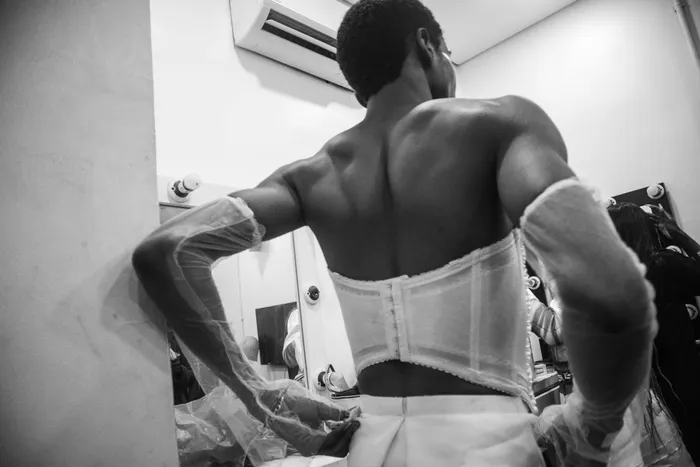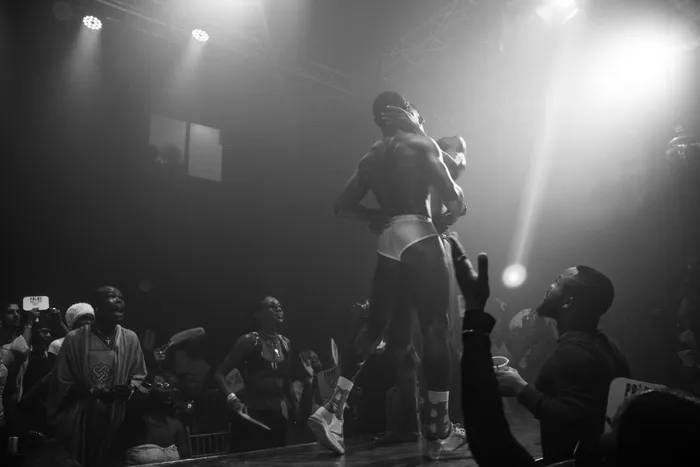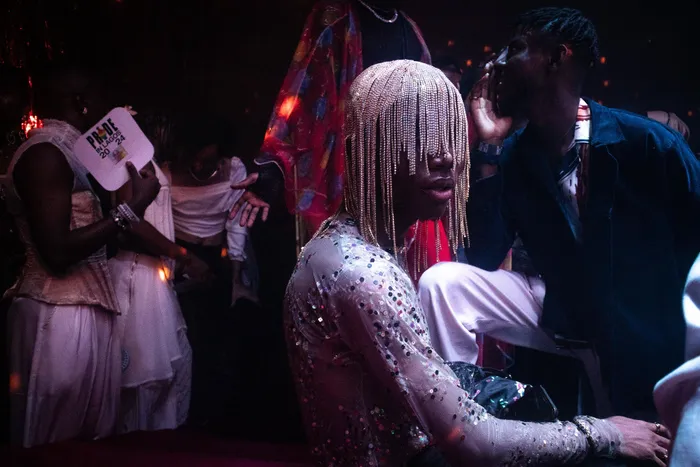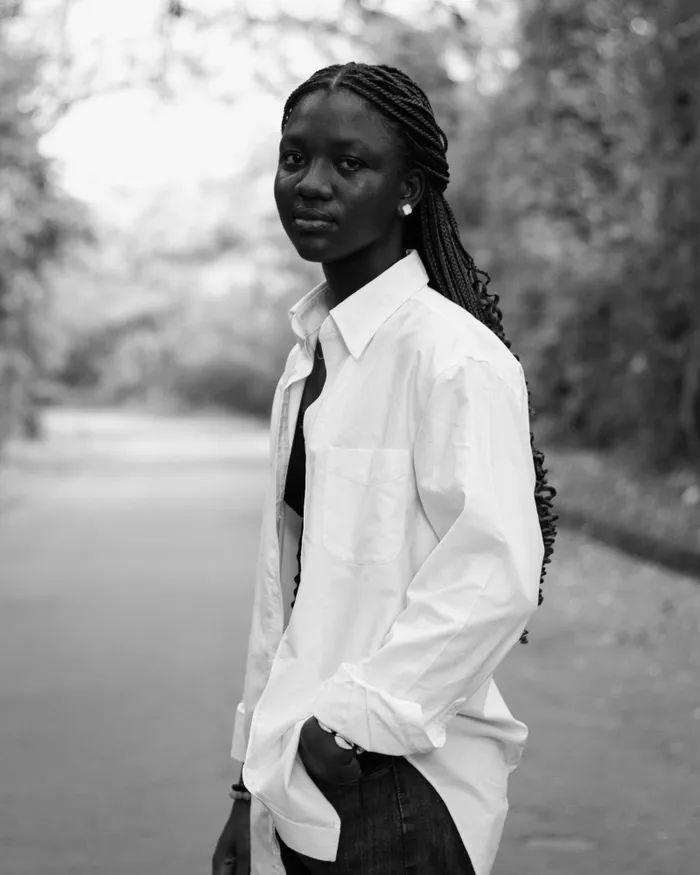Heavenly bodies: How Nigeria’s underground ballroom scene is rewriting queer visibility

At Nigeria’s underground ballroom events, queer people find a rare space to express their true identities - even if only for a night.
Image: Temiloluwa Johnson
When Temiloluwa Johnson says, “it’s always a good day to be queer”, one almost expects a sardonic laugh to follow. Particularly given that the young photojournalist is based in Nigeria, a country long renowned for being repressively anti-queer. The West African country’s Same-Sex Marriage Prohibition Act carries with it sentences of up 14 years imprisonment for those found guilty of consensual same-sex sexual relations.
The Act also imposes a 10-year prison sentence on anyone who “registers, operates or participates in gay clubs, societies and organisation” or “supports” the activities of such organisations.
Despite this repressive context, queer folk and their allies across the West African continue to seek, find and create safe space for gathering and self-expression.
An example of this is Lagos’s ballroom events. It is one of these “good day to be queer” events which Johnson turned her lens to, and ultimately led to the creation of a moving collection of photographs, titled ‘Heavenly Bodies’. Her efforts saw her scooping this year’s World Press Photo Contest Award, in the Africa Singles category - a mere 12 months into her career as a photographer.
Carl Collison (CC): Let's talk about the balls. I have been covering queer Africa for years, but I did not know… I maybe naively didn't expect there to be a ball culture in Nigeria…
Temiloluwa Johnson (TJ): I also don't know. It just blew my mind when I [found out]. I also did not know until 2023… In 2023, there was a ball, but I did not attend because I had an exam to write in school. I was so sad. (Laughs) Thankfully, it was because I was moving around a lot with the queer people that I found online. It was also that year that I came into my sexuality.
So, I started to look for a community to move around with and… they gave me that ‘chosen family’ kind of love there. So, I used to get invited to events and, in 2024, the founder, the curator of that event, reached out and was like, ‘Oh, there's this ball going on. Are you free to attend?’ I was like, ‘Yes, I'm up. My bro, I'm up.’ (Laughs) It happened on the 21st of June, 2024. And I'm glad that I went.

Despite laws that criminalise their existence, Nigeria’s queer communities continue to create joy, family, and fierce beauty - and refuse to be erased.
Image: Temiloluwa Johnson
CC: I heard that you went through quite a lot to attend the event. Like, traffic and rain and sickness.
TJ: Oh my God. It was a lot. I was so sick, but I kept shooting. Like, I was on my toes for nine hours shooting and moving from one place to the other, because I was also excited to be here. Everything felt new to me. It was so electric, right? But because of the ‘no photo or video’ policy, I was [one of] two photographers that the founder reached out to. So, I was one of them. And I was documenting everywhere from backstage to the main stage. Like, I was just going back and forth. So it was, it was really stressful working on while that was happening. I didn't really feel the stress when I was doing it until the next morning. (Laughs)
CC: Oh no. (Laughs) Well, you got an award out of it…
TJ: Right? (Laughs)
CC: How did you feel like winning that? Like that's, that's huge, especially for someone who is so early in their career. And for it to be queer and from Nigeria. It must hit all kinds of affirmations or validations for you.
TJ: Yes. Yes. Especially because, like I said before, I found this community in 2023 and they trusted me enough to tell their story with so much intimacy and tenderness, that it took the story from a local space to a global context. So, I'm just quite grateful because it's [one] thing to just take the camera and take pictures, but I had to do it in a way that dignified the people, the subjects, that were in them - especially because I had a very intimate relationship with them.

In the shadows of Nigeria’s anti-queer laws, a defiant celebration of identity unfolds in the country’s underground ballroom scene.
Image: Temiloluwa Johnson
CC: Yeah, the pictures are glorious. And I love that you mentioned ‘tenderness’, because for me, I found that, yes, it's celebratory and yes, it's fierce and yes, it's visually striking, but there's such a tenderness there to me. What are some of the magical moments that really stick out for you beyond the camera?
TJ: So, at the ballroom, there were different categories. There was Luscious Lips, Sex Siren, The Realness, European Runway, Pop, Dip and Spin… a lot of those things, right? And it wasn't only rad because of the camera, it was rad because of the people that were walking the stage. It felt like a space to fully be themselves, because everyone that entered that ball changed [into their ball outfits] in the dressing room. It's not possible for them to have worn what they wore to walk the stage from their houses because of the security issues, right? So, it felt like the moment they entered that building, they were able to fully be themselves. So, they were a defiant version of their identity the moment they opened the door to the venue. Most people might not have seen that in the pictures. You see celebration, you see joy, you see so much and you see the light and things like that. But outside of that, these are people that consistently refuse erasure with their everyday existence. They are being themselves loudly, even in a place that tells you not to be very invisible. So, it was important for me to tell that story with so much radical care.
CC: Radical care. I love that. So how do you go about ensuring people's anonymity? How do you navigate that in terms of like, ‘I want the shot, but I can't because, so-and-so is visibly in the shot?’

In a country where queerness is criminalised, Nigerian photojournalist Temiloluwa Johnson has turned her lens on the underground ballroom scene in Lagos - a space of defiance, joy, and chosen family for queer communities. Her powerful photo series Heavenly Bodies captures the beauty and resilience of queer life in Nigeria, earning her a prestigious World Press Photo Award and spotlighting a culture that insists on being seen despite the threat of erasure.
Image: The Eximius Nimi
TJ: It was one of the things that I had to do, but it challenged me in a good way. Because a photographer should get a story with or without the face. So, at the time, I approached the story with intention and discretion. To make sure that I was looking to only shoot faces when I know that they're actually out and they would not mind. While the ones that I know are not out yet, [when taking pictures of them] I would focus on the details. So, I leaned forward into details: Texture, skin, light, silhouettes, hair, movement, the way the light interacts with the walkway. I just found things like those that still show how the event felt, not only what the events look like.
CC: Let's talk about just the importance of documenting queer lives, particularly in a country like Nigeria, where it is so difficult to exist as a queer person.
TJ: Okay, so this question, when I get asked [it], I usually don't know the angle to follow. But I would say that doing that story was deeply personal to me. Especially because I was finding myself, and these are the people that I found myself through. And, as a queer Nigerian and cultural artist, I sort of know the cost of visibility. Being a queer Nigerian is [always] trying to not be in the wrong place at the wrong time. So, as an artist, too, I also know the power of being safe. Because it's important that we name, that we give a language, a visual language to the things that we fear… to our vulnerabilities… to the things that make us stand out. Or else we are giving room for erasure. This is the culture of being queer. And it deserves to be documented. And it deserves to be documented in all of its truth and in all tenderness… And I also think that these things are political. Being queer, having this sort of identity, in fact, is political. Because you have to always make sure that you are not erased. That what you stand for, what you are, what you do, is not erased.
CC: What are your hopes and dreams for yourself, for the broader Nigerian queer community, and for the broader African queer community?
TJ: Well, this is also a tough one (Laughs) … Okay, so, despite the criminalisation, the violence, and the social stigma, queer people are still finding ways to dance, to care for one another, to live out loud. So, I want stories like this to help challenge narrow ideas of queerness in Africa. And also remind people that survival like this deserves to be witnessed and celebrated.
Originally published on Beyond the Margins, a platform that showcases underrepresented voices and perspectives through art, writing, and storytelling.
Related Topics: